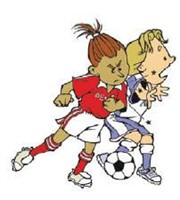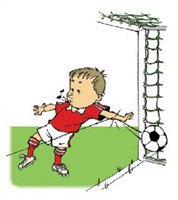   
|
| FOULS AND MISCONDUCT ARE PENALIZED AS FOLLOWS: |
1. DIRECT FREE KICK
A. A direct free kick is awarded to the opposing team if a player commits any of the following six offenses in a manner considered by the referee to be careless, reckless or involving disproportionate force:
1. kicks or attempts to kick an opponent, or the ball in possession of the goalkeeper; or
2. trips or attempts to trip an opponent; or
3. jumps at an opponent; or
4. charges an opponent; or
5. strikes or attempts to strike an opponent, including a goalie throwing the ball vigorously at an opponent, or pushing an
opponent with the ball while still holding it; or
6. pushes an opponent.
B. A direct free kick is also awarded to the opposing team if a player commits any of the following four (4) offenses:
1. when tackling, makes contact with the opponent before contact is made with the ball. A slide tackle made from outside the
peripheral vision (the rear 180 degrees) of an opponent in control the ball also is a violation, even if first contact is with
the ball; or
2. holds an opponent; or
3. spits at an opponent; or
4. handles the ball deliberately, i.e. carries, strikes or propels with hand or arm (this does not apply to the goalkeeper within
his or her own penalty area).
C. The direct free kick shall be taken by the opposing team from the place where the offense occurred, unless the offense is committed by a player in his opponents' goal area, in which case the free kick shall be taken from any point within the goal area.
D. In the Passers (U8) division, all of the foregoing fouls shall result in an indirect free kick.
|
   
|
2. PENALTY KICK
A. Should a player of the defending team commit one of the above offenses within their own penalty area, he (or she) shall be Penalized by a penalty kick.
B. A penalty kick can be awarded irrespective of the position of the ball, if in play, at the time an offense within the penalty area is committed.
|
   
|
3. INDIRECT FREE KICK
The commission of any of the following offenses will result in the award of an indirect free kick, taken by the opposing team at the point of infringement subject to the overriding conditions of Law XIII.:
A. DANGEROUS PLAY- Playing in a manner that could result in injury to the player or to any other player. "Dangerous Play" is a judgment call. The examples given are not exclusive:
1. Raising the foot, in an attempt to play the ball, to the level of another player's chest or higher when the opponent is in
normal position.
2. Using a double kick (scissors, bicycle or hitch kick) within playing distance of an opponent.
3. Lowering the head to a level of the waist or lower in an attempt to head the ball in the presence of another player.
4. Playing or attempting to play the ball while lying on the ground within playing distance of another player.
B. SLIDE TACKLING FROM THE REAR WITH NO CONTACT- A slide tackle made from outside the peripheral vision (the rear 180 degrees) of an opponent in control of the ball where no contact is made with either the ball or the player.
C. CHARGING FAIRLY- (i.e., with the shoulder to the shoulder of an opposing player, when each player has at least one foot on the ground) when the ball is not within playing distance of the players concerned.
D. OBSTRUCTION- When not playing the ball, intentionally interposing the body so as to impede an opponent's movement.
E. FOULS AGAINST THE GOALKEEPER- Charging a goalkeeper (1) while ball is in goalkeeper possession... or ... (2) in the goal area - whether or not the ball is in goalkeeper possession.
F. IMPROPER CLEARING OF THE BALL BY THE GOALKEEPER- The following rules shall apply to goalkeepers when clearing the ball:
1. Goalkeepers may run or walk with the ball take any number of steps while inside the penalty area, as long as there is no
excessive delay in clearing the ball. The following rules 2 a, b, and c do not apply in any way to Passers (U8) and Wings (U10) 2. Strikers, Kickers, Minors, and Seniors goalkeepers (U12 through U19)
a. The goalkeeper, from the moment he or she takes control of the ball with his or her hands, may take no more than
six (6) seconds while holding, bouncing, or throwing the ball in the air and catching it again without releasing it into
play.
b. The goalkeeper, having released the ball into play may not touch the ball again with his or her hands unless it has
been touched or played.
i. by a player of the opposing team (either inside or outside of the penalty area; or
ii. subject to provision (c) below, by another player of the goalkeeper's team outside of the penalty area.
c. On any occasion when a player deliberately kicks the ball, or throws the ball on a throw-in to his own
goalkeeper,
d. the goalkeeper is not permitted to touch it with his (or her) hands.
If, however, the goalkeeper does touch the ball with his (or her) hands, he (or she) shall be penalized by the award of an indirect free kick to be taken by the opposing team from the place where the infringement occurred, and in accordance with the overriding conditions of Law XIII. |
   
|
 
|
4. CAUTION - YELLOW CARD
A. A caution shall be administered:
1. If a player enters or leaves the field of play without the referee's permission
2. If a player persistently infringes the Laws of the Game
3. If dissent is shown by words or action with any decision of the referee
4. If a player engages in unsporting behavior. For example: an attempt to prevent a throw-in from being taken, or to prevent a
goalkeeper from clearing the ball, or use of inappropriate language or gestures.
5. If a player fails to respect the required distance when play is restarted, or otherwise delays the restart of play.
B. The referee need not stop the game to administer a caution; the advantage clause may be invoked. The caution will be administered as soon as play stops. C. If the referee stops the game to administer a caution, the game shall be restarted by an indirect free kick taken by a player of the opposing team from the place where the ball was when the referee stopped the game, subject to the overriding conditions of Law XIII.
A player receiving a caution may be substituted for, and may not return until the team's next opportunity for substitution.
|
5. EJECTION - RED CARD
A. A player will be ejected from the game for:
1. violent conduct
2. serious foul play, including:
a. deliberately handling the ball, thereby denying his opponent a goal, or an obvious goal-scoring opportunity, (other
than the goalkeeper within his own penalty area) and
b. impeding an opponent who is moving toward his opponent's goal with an obvious goal-scoring opportunity, by
committing any offense punishable by a free kick (or penalty kick), and thereby denies the attacking team an
obvious goal-scoring opportunity
NOTE: Application of provisions 2a & 2b above may be inappropriate for Passers (U8) and Wings (U10)
3. the use of offensive, insulting, or abusive language
4. An offense requiring a second caution
B. If the game is stopped to eject the player, no other Law having been infringed, an indirect free kick shall be awarded to the opposing team from the point of the offense, subject to the overriding conditions of Law XIII. |
-------------------------------- NOTES --------------------------------
|
"Possession" by the goalkeeper is having control, even if only one hand.
Charging of the goalkeeper in the goal area or when the ball is in goalkeeper possession, or attempting to kick a ball in the goalkeeper's possession MUST be punished by a caution or ejection, the choice to be subject to the referee's judgment.
If a player impedes the progress of the opposing goalkeeper, in an attempt to prevent him from putting the ball into play, the referee shall award an indirect free kicks.
If a player places his body between the ball and an opponent without touching it in an endeavor not to have it played by an opponent, he impedes but does not infringe Law XII-3.D while the ball remains within playing distance, and may be fair-charged while playing the ball
Deliberate parrying of the ball by a goalkeeper shall not be considered as goalkeeper possession and, as such, the goalkeeper is free to subsequently pick up the ball without being subject to penalty.
If a player leans on the shoulders of another player of his own team in order to head the ball the player shall be cautioned for unsporting behavior.
If a player positions his arms to impede the progress of an opponent and steps from one side to the other, moving his arms up and down to delay his opponent, forcing him to change course, but does not make "bodily contact: the play shall be cautioned for unsporting behavior.
If a goalkeeper intentionally lies on the ball longer than is necessary, the goalkeeper shall be cautioned for unsporting behavior.
While caution and ejection rules also apply to coaches, it is recommended that play not be stopped merely to administer such caution or ejection. If play is stopped merely to administer such caution or ejection, play is to be restarted appropriately in accordance with Law VIII-7
Any player, whether he is within or outside the field of play, whose conduct is unsporting or violent, whether or not it is directed towards an opponent, teammate, the referee, an assistant referee, or other person, or who uses offensive, insulting or abusive language, shall be dealt with according to the nature of the offense committed.
If, when a referee is about to caution a player, and before he has done so, the player commits another offense that merits a caution, the player shall be ejected.
|
|
| |